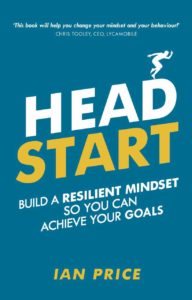It’s normal to have a fear of failing. Psychologist Ian Price says there is no success without some failure – it’s all about bouncing forward, not back
We’ve come to think of failure as unambiguously bad and something to avoid, something from which to screen our children.
After the caucus race in Lewis Carroll’s Alice in Wonderland, the Dodo famously announced: ‘Everybody has won and all must have prizes’.
This attitude now prevails in some educational circles in which sports days for children revolve around preserving self-esteem rather than celebrating winners.
The brutal fact is that life is a competition and if we fear failure, we risk not taking part in the first place.
The brutal fact is that life is a competition and if we fear failure, we risk not taking part
Are millennials equipped to deal with failure? In social media, we love to flaunt success but admitting failure in anything is stigmatised. If we don’t feel able to acknowledge it, this can prevent us learning its role in our ultimate success.
When we look at the science of achievement in sport, business and just about anything else, it turns out that far from being bad and something to avoid, failure can be positive and indeed necessary.
Here are seven reasons why:
1. Failing builds resilience
When we experience failure, it’s inevitable that the experience will leave us bruised and fearful of trying again.
Professor Martin Seligman, the grandfather of Positive Psychology, coined the ‘three Ps’ to describe the way in which our explanation for failure will determine how well we bounce back.
If we describe it as ‘personal’ (‘I’m not cut out for this’), ‘permanent’ (‘this is never going to happen’) or ‘pervasive’ (‘my whole life is going to hell in a handcart’), then these sentiments can be self-fulfilling.
In order to build our resilience muscles, we need to acknowledge external reasons for our failure and think of it as one isolated incident in time before taking a deep breath and starting again.
Seligman describes the ability to do this as positive explanatory style or optimism. Optimism in this context doesn’t mean having a Pollyanna-ish insistence that everything is going to turn out okay; it means explaining negative events to ourselves in a way that isn’t personal, permanent or pervasive. Some people have an innately high level of optimism.
The good news is that this can be built, hence the expression ‘learned optimism’, the title of Seligman’s book on the topic.
READ MORE: How to become more resilient
2. Don’t just bounce back, bounce forward
‘What doesn’t kill you makes you stronger’. Nietzsche’s famous quote was whispered by Terry Venables to Gareth Southgate in the immediate aftermath of his missed penalty at Euro ’96.
Now that he is England manager, Southgate frequently refers to having ultimately been strengthened in the crucible of this experience and has brought his learning to bear with the current team.
Asked about how he deals with the public pressures associated with the ‘impossible job’ of England manager, he often makes the point that the aftermath of his penalty miss has steeled him for anything.
Resilience is not just about bouncing back from failure – it’s about ‘bouncing forward’.
Psychologists are increasingly finding evidence for something called Post-Traumatic Growth after even the most traumatising experiences.
As with so much in life, how you cope with failure will be determined by your mental model of it. So think of failure as something from which you can emerge stronger.
3. Failure is a learning experience
Thomas Edison was once asked how it felt to fail 1,000 times on the way to inventing the light bulb.
‘I didn’t fail 1,000 times,’ Edison responded. ‘The light bulb was an invention with 1,000 steps.’
The fact is that with a growth mindset, we can learn to reframe failure from resounding confirmation that we’re not up to the task to just another part of our growth journey.
Designers have a long succession of prototypes all of which fail on the way to finding the final design. Embrace a design mindset which accommodates failure as part of the process.
4. Successful people learn to accept failure on the way to success
When we observe those that have achieved success, we often assume that it has come easily or as a result of ‘talent’ or luck.
However, success has usually been achieved because of the willingness to embrace failure.
Most people that achieve success do not do so at the first attempt; their early careers are often littered with ignominious failures – what distinguishes them from those that didn’t make it was their ability to embrace failure and persist.
Japanese Olympic figure-skating champion Shizuka Arakawa has been described by experts as ‘born to skate’. But in his study of her career, Geoff Colvin estimated that she fell over in practice twenty thousand times on the way to Olympic success.
Imagine not knowing who she was and seeing her take a tumble on the practice rink – what might you have said to yourself?
5. Feel good about having tried
Trying and failing means never having to look back and say to yourself, ‘If only I’d tried…’
While we should never look at failure as permanent and irreversible, there is much to applaud in having tried in the first place rather than having stayed in our comfort zone.
one thing that is so much worse than failure is regret
Embracing failure means learning to make ourselves vulnerable, something that will ultimately help us achieve success and makes life a richer experience. And one thing that is so much worse than failure is regret.
6. Failure can be enjoyable in ways that might surprise you
We may focus on the negative outcome of our failure but we should not close our eyes to some of the benefits. When we make ourselves vulnerable and take risks, we open ourselves up to possibilities that we would not encounter if we had stayed securely in our comfort zone. Some of our most enduring personal relationships can come from failing – nothing builds friendship more than trying together and failing.
7. Failure makes success all the sweeter
Success that hasn’t been hard-won is rarely valued – think of lottery winners that squander their fortunes. But when failure has been encountered and overcome en route, then success is truly enduring, satisfying and something to be savoured.

Related Healthista Content
Brain training: 7 surprising hacks to boost your mind
7 happiness short cuts this psychologist wants you to do every day
10 foods proven to relieve stress
11 self-care tips these wellness experts want you to do daily
Like this article? Sign up to our newsletter to get more articles like this delivered straight to your inbox.
























































